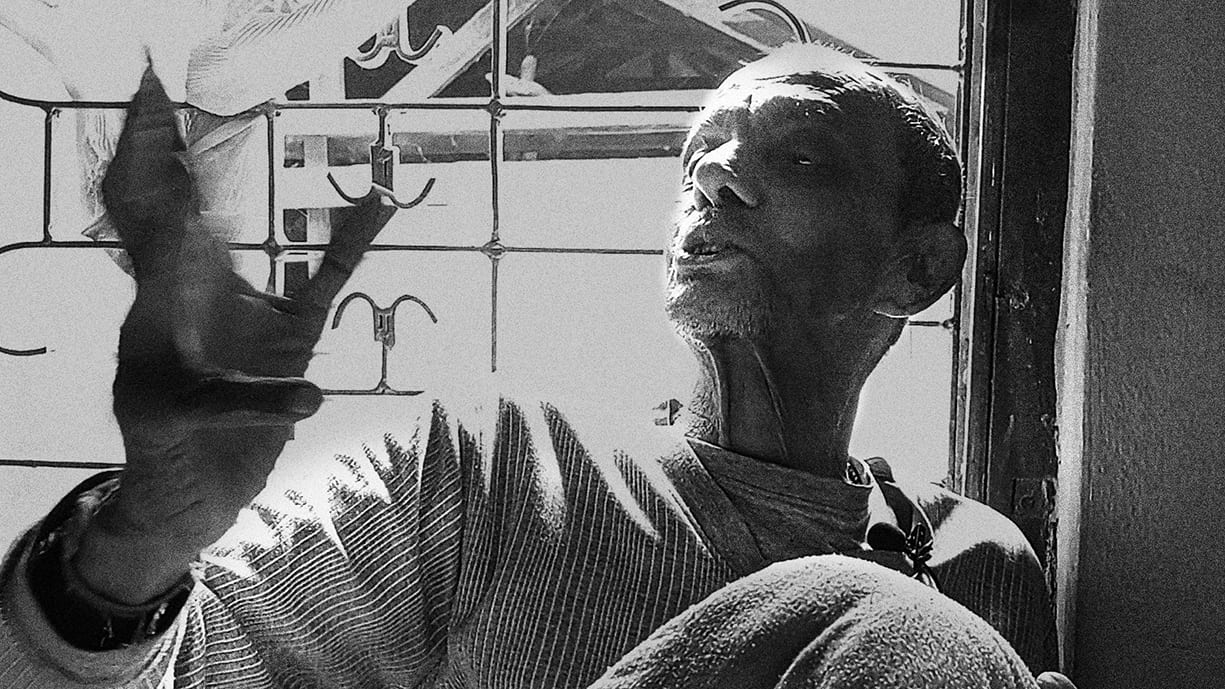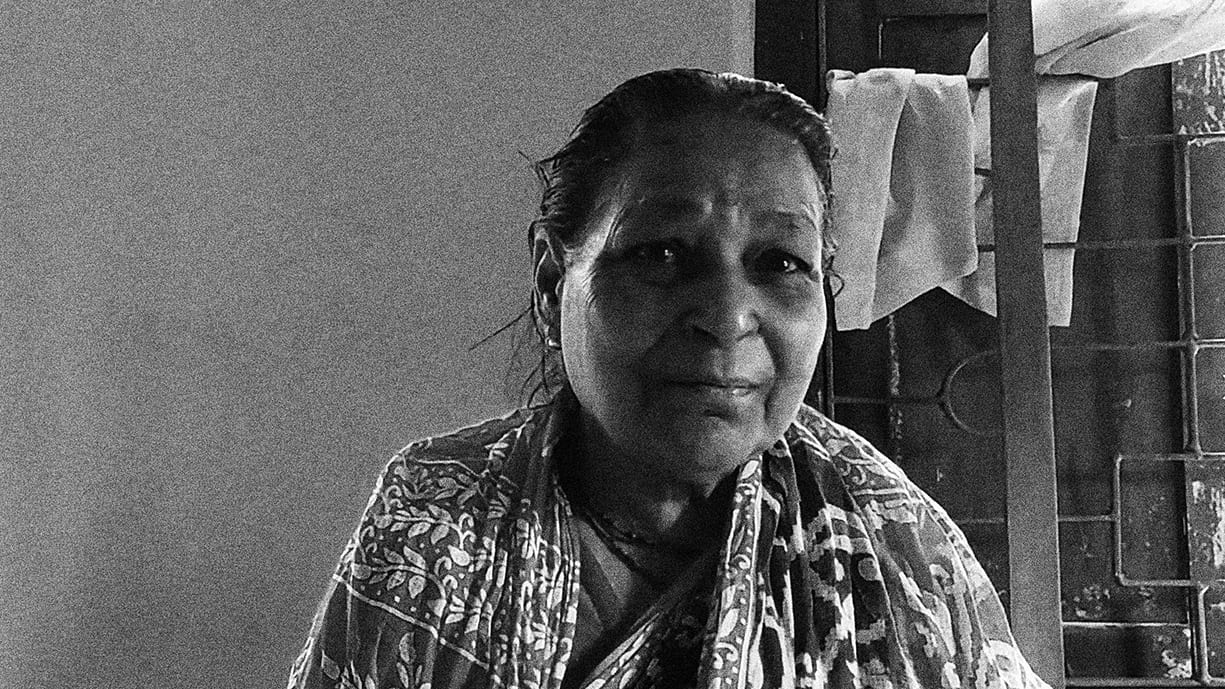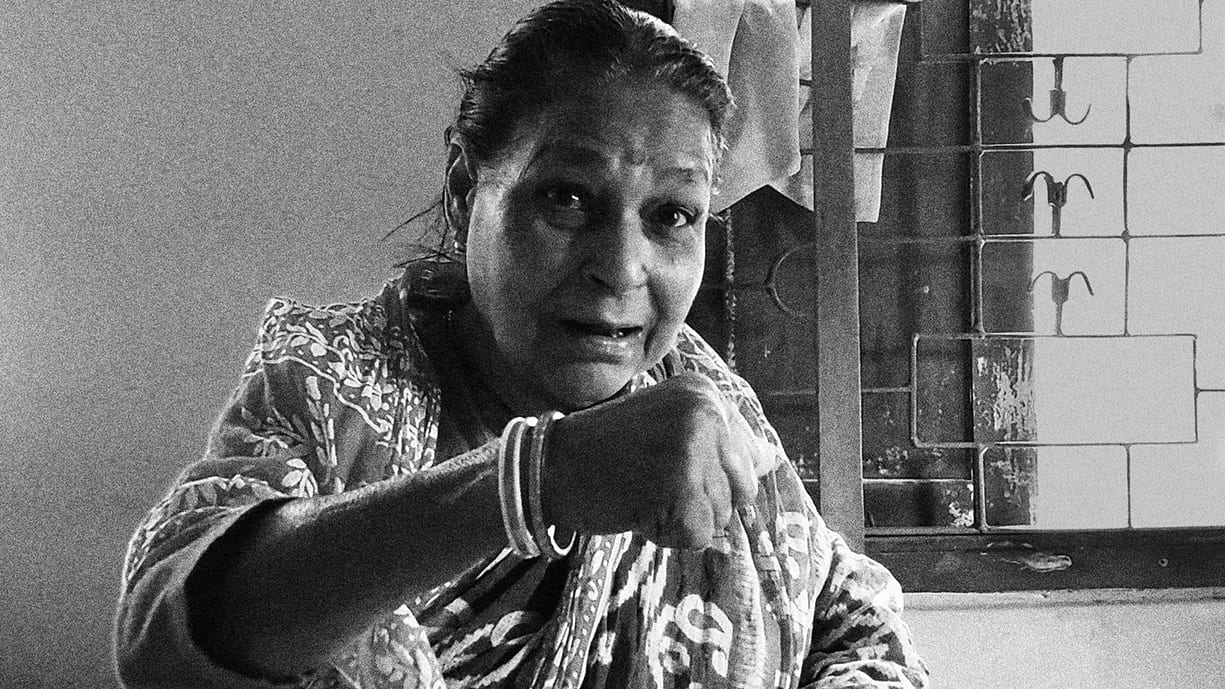Amulya Ghosh & Kera Rani Ghosh
Migration Geography
Sylhet (Bangladesh)
Kamalpur (India)
Dharmanagar, Tripura (India)
“No, I didn't bring anything out of fear that we might face something on the road. Just carried a few items of jewellery like bangles and chains, hidden inside a paan-container. Yes, I do regret it. (about leaving Bangladesh). That we left our homeland, never to return.”
“না। ডরাইয়া কিছু আনসি না। ধরো রাস্তায় যদি কিছু উল্টা পাল্টা হয়। একটু সোনার গয়না ধরো হাতের, গলার, ওটা পানের বাক্সের ভিতরে আনসি। সেটা তো আফসোস আসেই। ওইতো আইলাম আরকি নিজের জন্মস্থান সারিয়া। এইখানে আইলাম আর সেই মাটিও দেখলাম না।”
Interviewer – Firdosi Akhtara Basid
Summary – Firdosi Akhtara Basid
Transcript – Rituparna Roy & Soumalya Chatterjee
Portrait Image - Aurgho Jyoti
Interview Location – Dharmanagar, Tripura (India)
Interview Date – 22 December 2021
Summary
Amulya Kumar Ghosh had migrated to Dharmanagar, in the state of Tripura along with his family during the Bangladesh Liberation War in 1971. The pain of leaving their own homeland becomes easily traceable in the saying of Kera Rani Ghosh, wife of Amulya Kumar Gosh, as “Je matite boro hoyechi shei mati ar dekte pela na (The land where we have grown up, wasn’t able to see that land again)”. Here the word ‘land’ resembles emotion, pain, and homelessness. On the other hand, Surendra Kumar Nath had a very dire childhood life as he had to suffer financial crisis at expense, his study in the new village in Kadamtal which is in Indian state of Tripura. His narrative also shares the discomfort of having military movements and blasts in the adjacent areas of his village during the 1971 war.
Transcript in English
Part 1-
6.18- 7.27
AKG: Then we were two of us, two and two four people.
Question: In your family, there were the two of you and…
Answer: My sister-in-law… and her son.
Question: 12 of you came…
Answer: Yes, 12 of us came on a single pass. For 3 years, no… 4 years, other members of my family came.
Question: So you came alone?
Answer: No, he was not alone, there were others too.
11.30- 13.15 (1 min 45 secs)
AKG: After this, my brother said, let’s go…
[Photograph shown]
Question: Do you have any memorabilia carried from that side? Like photos?
Answer: No, there’s nothing. My mother-in-law died there only. We came here a year after her death. There’s no photo of her. There’s none of my father-in-law as well. You see the photo there – that’s my father.
Question: Where is your father here?
Answer: After coming to this country, my brother went to Karimganj suddenly one day and took photos.
Answer: These photos are of my father and father-in-law.
Question: How old is this photograph?
Answer: 30/37? At that time, my father-in-law was there, so was my father… two more… the girl among those two was my mother. And the man on this side, he is my elder brother-in-law. Means, my husband’s elder brother. Your grandfather’s elder brother. He died a long time ago. The photo is there. He had gone to London.
Question: London? What do you mean?
Answer: He did his BA there, then came here and worked for a year. And then went to London.
He taught in a school there, leaving behind his wife and three-month-old child in this country.
Question: Did he go to London from that country?
Answer: Yes; and his wife and child came to India with us. When he returned from London, his my son was six-years old.
Question: Did you bring any belongings when you came here?
Answer: No, didn’t bring anything out of fear that we might face something on the road. Just carried a few items of jewellery like bangles and chains, hidden inside a paan-container.
Question: Have you ever felt that you were better off in that land?
Answer: Yes, I do regret it.
Question: What do you regret?
Answer: That we left our homeland, never to return.
Part-2: 8.20-9.30
Question: Then when you two… may God’s blessings be with you, but when you won’t be there any more, how will the children know, I mean…the children will hear these stories from us, their children will hear it from them…
Answer: I know…
Question: From where have you come? Have you come from Bangladesh? Why did you come…? If we know the story of the household, it will be easy to find out the papers.
Answer: At the time that I came from India, there was a Muslim named Wajid Ali – an MLA from
Kodomtola Centre. Those who came were educated. They would go to his shop to get their voting papers done. When I went to his shop, he welcomed me. Wanted to know more about me. Said he had a cousin in Pakistan. Then he said, give me three rupees. I gave him three rupees from my pocket… he took the money and wrote my name on the voting paper.
Transcript in Bangla
Part 1-
6.18- 7.27
KRG: তখন তো আমরা দুজন, দুজন দুজন চাইরজন।
প্রশ্ন: আপনার পরিবারে মানে, আপনারা দুজন আর…
উ: আমার বড় জা — আর তার একটা ছেলে আসিল।
প্রশ্ন: ১২ জন, আপনারা আইলেন…
উ: ১২ জন তো আমরা এক পাশে আইসি।
আমি ৩ বসর, না ৪ বসর… আমার পরিয়ালের অন্য লোকেরা আইসে।
প্রশ্ন: তা একা একা আসিলে…
উ: একলা একলা নয়, আরও মানুষের আসিল।
11.30- 13.15 (1 min 45 secs)
AKG: এর পরে, আমার ভাই কই, সলো…
প্রশ্ন: আচ্ছা আপনারা যে ওইদিক থিক্যা আইসেন কিছু জিনিষ টিনিশ কিছু আসে কি? কিছু ফটো?
উ: না কিছু তো নাই, ওই যে আমার শাশুড়ি কে আসলা না নি? তাই তো ওই দেশেই মারা গেসে।
মারা যাওয়ার এক বসর পরে আমরা আইসি। কোনো ফটো নাই। আমার যে শ্বশুর আসলা তাইরো
কোনো নাই। ওই যে একটা ফটো। ওই সাইডে যে, তাই আমার বাবা।
প্রশ্ন: কই আপনার বাবা?
উ: এই দেশে আসার পরে আমার ভাইয়ে হঠাৎ কইরা একদিন করিমগঞ্জ যাইয়া ফটো তুলসে।
উ: এই হলো আমার বাবা, আর আমার শ্বশুরের ফটো।
প্রশ্ন: আচ্ছা, এই ছবিটা কতো আগের হবে?
উ: শোনো ৩০/৩৭ আগের হইবো? তখন আমার শ্বশুর থাকতে, আমার বাবা থাকতে — আরও দুই
টা সে… ওই আরও দুইটার মধ্যে, যে মেয়ে লোক, সেইটা আমার মা। আর এই সাইডে যে, আমার বড়
ভাসুর, মানে এনার বড় ভাই। তোমার দাদুর বড় ভাই। তাই ও ওই দেশে তো মারা গেসে। ফটো টা
উঠাইয়া রাখসে… তারপরে আমার ভাসুর লন্ডন গেসে…
প্রশ্ন: লন্ডন মানে?
উ: সে বিএ পাস করসে ওইখানে, তারপর এই দেশে এক বসর চাকরি করসে। তারপর লন্ডন
গেসে। ওইখানে গিয়া মাস্টারি করসে বাংলা স্কুলে। আর তার তিন মাসের বাচ্চা আর বউ সারিয়া
গেসলো এই দেশে।
প্রশ্ন: সে কি দেশ থেকে লন্ডন গেসলো?
উ: হ্যাঁ। আর ওর বউ আর বাচ্চা আমার সাথে ইন্ডিয়া আইসে। আর ও লন্ডনে থাকিয়া এই দেশে
আইসে তখন তার সেলের বয়স ছয় বছর।
প্রশ্ন: আপনারা যখন আসেন তখন কিছু আনসেন না সাথে?
উ: না। ডরাইয়া কিছু আনসি না। ধরো রাস্তায় যদি কিছু উল্টা পাল্টা হয়। একটু সোনার গয়না ধরো হাতের, গলার, ওটা পানের বাক্সের ভিতরে আনসি।
প্রশ্ন: দিদা, আপনার কি কখনো মনে হয়েছে যে ওই দেশেই ভালো ছিলাম?
উ: সেটা তো আফসোস আসেই।
প্রশ্ন: কি ধরনের আফসোস?
উ: ওইতো আইলাম আরকি নিজের জন্মস্থান সারিয়া। এইখানে আইলাম আর সেই মাটি দেখলাম না।
Part-2: 8.20-9.30
প্রশ্ন: তারপর যখন আপনারা… ভগবান না করুন, আপনারা যখন থাকবেন না, এরা যে সোটো বাচ্চা
তারা কিভাবে জানবে, মানে এ… এই কথাগুলো তখন আমার কার থিক্যা, আমার যারা সোটো,
তারা জানবে; তাদের কাছ থিক্যা, তাদের সোটো যারা, তারা জানবে…
উ: জানি…
প্রশ্ন: আপনারা কই থিক্যা আইসেন? বাংলাদেশ থিক্যা আইসো? কি কিতার লাগিয়া আইসো? গল্পটা বংশের একটা বাচ্চার জানা থাকলে কাগজ বাইর করতে সহজ হইবো।
উ: আমি যে সময়, ইন্ডিয়া থেকে আইসি, ওয়াজিদ আলী বলে একজন মুসলিম আসিল কদমতলা সেন্টারের এমএলএ —, যে সব আইসে তারা শিক্ষিত মানুষ বলে তার দুকানে যাইতো ভোটের কাগজ বানাইবার জন্য — আমি যখন তার দুকানে গেসলাম সে বলতো আপনি যে আইসেন, কুন দিন আইসো তুমি,কুন জাগায় বাড়ি করসো — আমার মাসতুতো ভাই একটা আইসে। পাকিস্তানে থাকি। সে আবার বললো আচ্ছা তিনটা টাকা দাউ আমারে, তিন টাকা আমি পকেট থেইক্যা বাইর করিয়া দিলাম — তিন টাকা নিয়ে ভোটের কাগজে নাম উঠাই দিসে।



